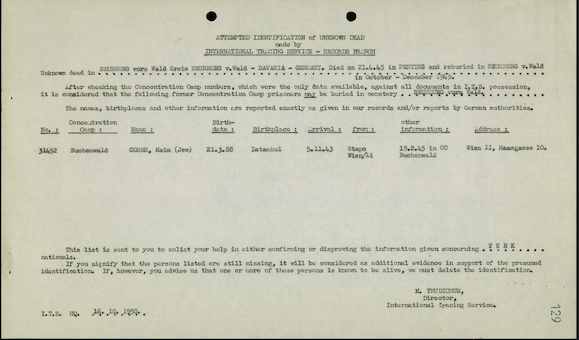Link to Family Tree to understand family relationships.
Today’s letter #51a from Helene to her 16-year old son Harry is a companion to #51 from Helene to his sister Eva which we saw in yesterday’s post. Helene is so grateful to both her young children who have demonstrated their love by sending their parents what little money they’ve earned in summer jobs.
Vienna, 20 September 1940
My dearest beloved Harry-Boy - This week I was finally released from the punishment of Tantalus. I got your letter from August 20 and the letter you wrote with others from the 31st. It is impossible to describe my happiness to you after 3-1/2 months of tortured waiting. Now I’m sorry that I wrote so many alarming letters and that they are still on the way to you and which are now only going to cause you dark hours. But you cannot imagine what kind of fear we experienced because we heard from all our acquaintances that they were getting letters quite regularly and we even got almost all of those which Everl sent me. But now the chalice has passed to us and we are hoping we will never be so long without letters from each other again.
Everl did promise in June to send me a surprise letter from my son. However -- the letter from the business concern in Berlin -- I couldn’t expect that surprise. I am nostalgic for the time when I could express my thanks in proper manner. God has not left anyone who has children like this. I believe that I have grown this week.
I am making more mistakes than I usually do today because I am nervous and my fingers just don’t go as fast as my thoughts when I’m trying to put them down on paper. I’m also writing in such chaos, which I did not get close to describing correctly in my letter to Eva and third, every moment seems like there is somebody ringing the doorbell from all those workers that are working on our house at this time. Every time I go to the door -- which requires gymnastic sport achievements from me -- after I do that, I am so exhausted that I have to catch my breath for a minute. I am also writing to you on a strange typewriter which I really still have to get used to or it has to get used to me. Well, you will excuse me I think. I am very interested in your dance lessons and the future plans that have to do with that. You want to import a wife from Europe? You should probably not say a lot about that over there. I hope I can help you choose someone and should this perhaps not be possible, then perhaps you will take my well-meaning advice. If you want to marry the daughter, then take a good look at the mother, because the apple doesn’t usually fall far from the tree. If you don’t like certain things about the mother, then forget about the daughter because even though she will be young and pretty, well the mother was probably like that at one time. Youth and beauty have vanished and everything else has remained. But isn’t it true, my dear son, that we still have some time?
Now I have quite a list of wishes. #1) you must tell me everything you did at Lake Tahoe, what you saw and experienced there, what you were doing there. Then I also want to know what you are learning in school; if you find it difficult or find it easy and what Hilda and Nathan said to you when you returned. I also ask that you tell me if all of my letters have arrived; the one on July 23 was #43.
Since I need to write to Paul today and it’s getting quite late, I end for today with many, many kisses.
Helen
P.S. Please stop growing. Is this a way of getting together with the clouds and the skyscrapers? If I ever go out with you, you will have to take a telephone because you will be so far away from me.
Although Helene mentions a companion letter to Paul, I do not have it in my possession.
Harry echoed his mother’s struggles with an unfamiliar typewriter in his own letter from 1943 to Eva which we saw on September 17.
Helene compares her thirst for letters from Harry to that of Zeus’s son Tantalus who was punished for his misdeeds by being forced to stand in a pool of water with fruit trees overhead, with both water and fruit being forever out of reach. The Wikipedia entry says that “Tantalean punishments” referred to “those who have good things but are not permitted to enjoy them.”


































